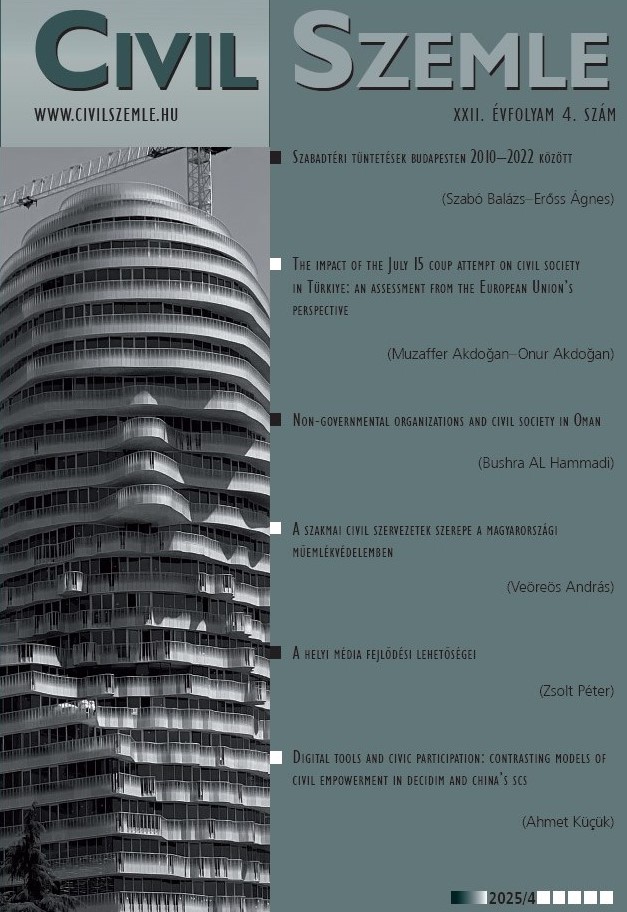Development opportunities for local media
Abstract
The paper starts from the small community media and its favorable regulation and optimal social and technical conditions. Due to its historical approach, it follows the deterioration of the conditions, then moves on to how the virtues of community organization can be passed on to the local level, to the democratic operation of local public affairs. A new publicity model created by the author is formulated. Its elements are propaganda, conflict and solution focus. The latter is a characteristic of small community radios, and it can also become a characteristic of local media that are supported but not dominated by the municipality. At the end of the study, methods that can help municipality-supported local media to become more democratic are formulated.
References
hu (2017). Elhunyt dr. Szecskő Tamás A Dió Rádió atyja https://3200.hu/2017/09/06/elhunyt-dr-szecsko-tamas-dio-radio-atyja/
Alinsky, D. S. (1971). Rules for Radicals: A Pragmatic Primer for Realistic Radicals. Random Hause.
Aronson, E., & Pratkanis, A. (1992). A rábeszélőgép. AbOvo Kiadó.
Bajomi-Lázár, P. (2000). Közszolgálati rádiózás Nyugat-Európában. Membrán Könyvek 6., Új Mandátum Könyvkiadó.
Clark, R. (2024). Radio Caroline: The True Story of the Boat That Rocked. The History Press.
Gordon, J. (Ed.) (2012). Community Radio in the Twenty-First Century. Oxford, Berlin, New York, Peter Lang Verlag
Cs. Kádár, P., Giczey, F., Péterfi, F., Thuróczy, G. & Weyer, B. (1999). Szabadon – a szabad közösségi rádiózás lehetőségei Magyarországon. Szabad Rádiók Magyarországi Szervezete.
Gosztonyi, G. (2007). Kisközösségi rádiók Magyarországon. Médiakutató, 2007 Ősz https://mediakutato.hu/cikk/2007_03_osz/03_kiskozossegi_radiok
Gyurkó, Sz., Mészáros, A. & Weyer, B. (2019). Sajtótanács https://kronika.civilradio.hu/sajtotanacs-2019-marcius-13/
Habermas, J. (1993). A társadalmi nyilvánosság szerkezetváltása. Gondolat Kiadó.
Huszti-Szalma, G. (2023). Csődület támadt… Médiakutató, 2023, Tél pp. 17-33. https://mediakutato.hu/cikk/2023_04_tel/03_moralis_panik_nok_nadragviselet_szazadfordulo.pdf
Kubatovics, Á. (2022). A helyi média felépíthetősége. https://ikmedia.hu/podcast/638c7aaf11f7630013d39bf2
Luhmann, N. (2008). A tömegmédia valósága. Gondolat – AKTI.
McQuail, D. (2015). A tömegkommunikáció elmélete. Wolters Kluwer.
Méltányosság (2010). Sajtótanács – 2010 – foci VB, Satótanács – Magyar Hírlap – Külpolitikai rovat, szlovák választások. https://meltanyossag.hu/?s=sajt%C3%B3tan%C3%A1cs
Méltányosság (2020). Sajtótanács elemzés az ATV vörösiszap-katasztrófa hírközléséről. https://ikmedia.hu/article/5f6b47d716619c10e4096566
Méltányosság (2025). A média közösségképviselete. https://ikmedia.hu/article/67c97d60f6153a0013ca1d31
Merkovity, N. (2018). A figyelemalapú politika a közösségi média korában. NMHH Médiatudományi Könyvtár. https://nmhh.hu/dokumentum/196007/MK32web.pdf
Pál, G. (2004). Tereket nyitó kulcskategória – A gyűlöletbeszéd fogalma a magyar politikai diskurzusban 1994-2004. Politikatudományi Szemle 20. (1.), pp. 97–116. https://poltudszemle.hu/wp-content/uploads/2023/07/fullissue_PoltudSzemle-2011-1.pdf
Reybrouck, D. (2017). A választások ellen. Gondolat Kiadói Kör.
Terestyéni, T. (Ed.) (1995). Közszolgálatiság a médiában. Ábránd vagy realitás? Jel-kép Könyvtár.
Zsolt, P. (2023). A demokrácia gyerekcipőben. Méltányosság, https://meltanyossag.hu/demokracia-gyerekcipoben/



